To tackle successful DIY projects, you’ve gotta have the right tools. Start with basic hand tools like a handsaw and chisel, plus fastening tools such as screwdrivers and nail guns. Don’t forget cutting tools like a circular saw, measuring tools for precision, and adhesives for strong bonds. Safety equipment like goggles and gloves is a must! When you’ve got your toolkit sorted, you’ll be ready for any project. There’s more to explore about optimizing your toolkit!
Key Takeaways
- Basic hand tools like saws, chisels, and screwdrivers are fundamental for a variety of DIY tasks.
- Power tools, including drill drivers and circular saws, enhance efficiency and precision in your projects.
- Measuring and alignment tools, such as tape measures and set squares, ensure accurate cuts and fitting pieces.
- Safety equipment like goggles, gloves, and dust masks are essential for protecting yourself during DIY activities.
- Regular tool maintenance, including cleaning and proper storage, prolongs tool life and ensures optimal performance.
Basic Hand Tools

Basic hand tools are essential for any DIY enthusiast, providing the fundamental means to tackle a variety of projects.
A handsaw is your go-to for cutting wood to the right lengths, while a chisel helps you create joints and remove small wood sections. Properly maintained personal gear is crucial to ensure safety during these tasks. Additionally, having the best extension cords on hand can help power your tools effectively. To guarantee accuracy, a square is invaluable for checking corners, and a marking gauge allows for precise measurements on wood. An understanding of basic air quality principles can also enhance your workspace environment, especially when using tools that may generate dust and particles, which is why air purifiers can be beneficial.
Sandpaper is key for achieving smooth surfaces.
Don’t forget about safety; wearing goggles protects your eyes, gloves enhance your grip, and a dust mask keeps you safe from inhaling particles. Additionally, understanding venting requirements for projects involving heat sources, such as wood stoves, can significantly improve safety and efficiency.
With these basic tools at your disposal, you’re well-equipped to take on any project with confidence and skill.
Fastening Tools
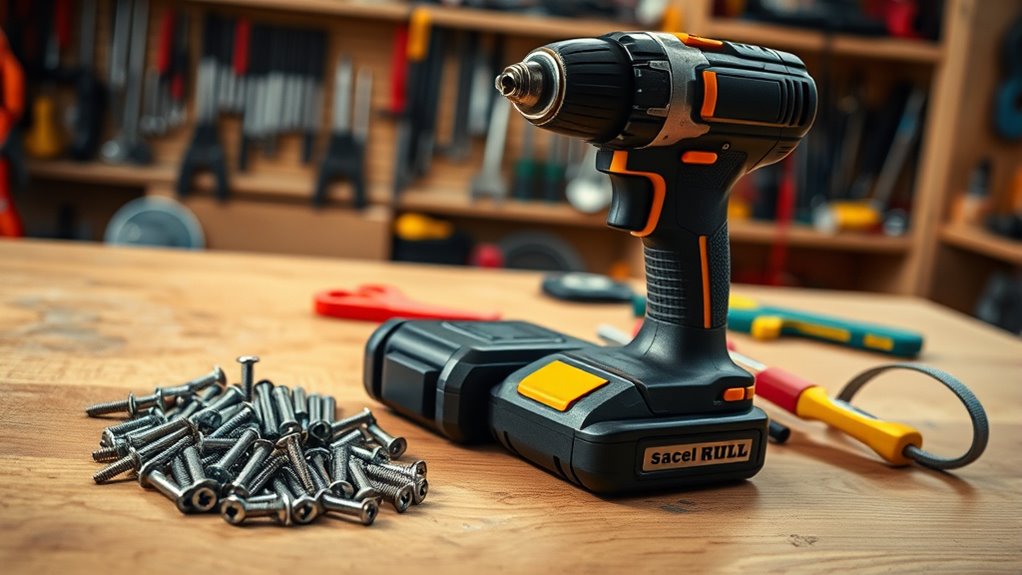
When you immerse yourself in DIY projects, fastening tools become indispensable for creating strong, durable connections. Hand tools like pliers, screwdrivers, and wrenches help you grip, shape, and secure materials effectively. Additionally, using energy-efficient appliances can enhance your overall project experience by ensuring that any tools requiring power operate at a lower energy cost. Regularly maintaining your tools can prevent issues similar to how regular grooming reduces shedding in pets, ensuring they remain effective for your projects. Furthermore, using high contrast ratios in your DIY projector setup can significantly improve the visual experience during movie nights.
Power tools such as drill drivers and impact drivers make driving screws and drilling holes quick and efficient, while nail guns speed up fastening tasks considerably. For more specialized jobs, riveting guns and screw guns guarantee precision and strength. Additionally, the choice of tip size can influence the quality of your fastening tasks when using certain tools.
Don’t forget about essential fasteners like nails, screws, and bolts, which are key to holding everything together. Accessories like washers and clamps can enhance your work by guaranteeing stability and even pressure. Additionally, implementing effective preventive maintenance strategies for your tools ensures they remain in optimal condition for all your projects.
With the right fastening tools, your DIY projects can achieve professional results.
Cutting and Shaping Tools

Cutting and shaping tools are essential for any DIY enthusiast who wants to achieve precision in their projects. A table saw is perfect for making straight cuts, while a jigsaw handles intricate patterns with ease. For larger projects, a circular saw delivers quick, straight cuts. If you need to make curved cuts, a band saw is your go-to tool. Hand tools like chisels and coping saws allow for more detailed work. Additionally, understanding airless spray painting tips can significantly improve your overall project finish when incorporating paint into your designs. Proper priming ensures smooth paint flow and prevents clogging, which is crucial for achieving a flawless paint application. Proper installation of these tools ensures not only efficiency but also safety during your DIY endeavors. Additionally, many woodworkers benefit from the use of high-efficiency rating tools that help reduce waste and improve precision. Routers and sanding tools help create polished edges and smooth surfaces. Don’t forget safety goggles and dust masks to protect yourself during these tasks. Additionally, utilizing mental resilience can enhance your focus and determination while working on your DIY projects. With the right cutting and shaping tools, you’ll elevate your DIY projects and guarantee they’re completed accurately and beautifully.
Measuring and Alignment Tools
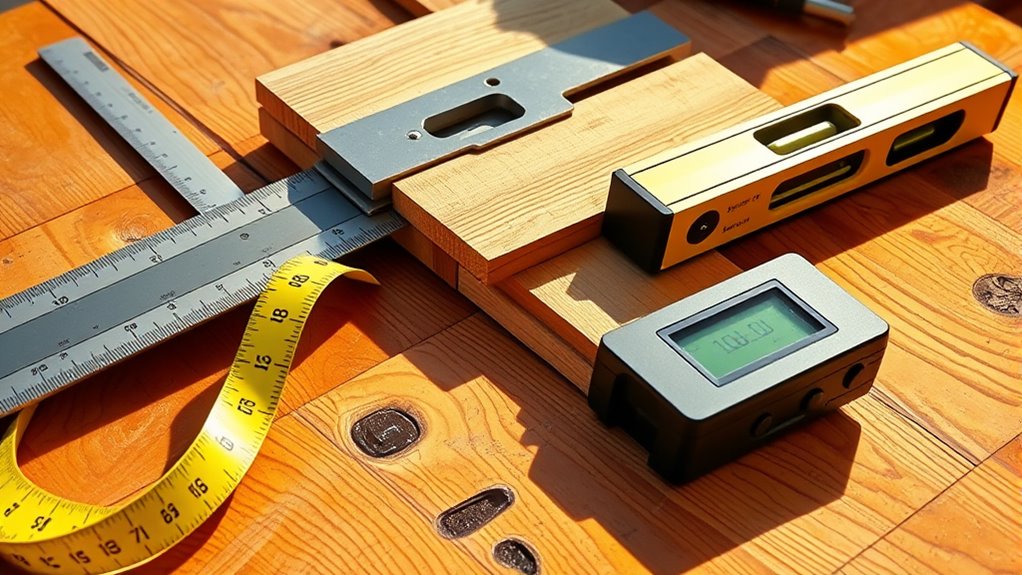
Accurate measurements and proper alignment are essential for successful DIY projects, ensuring everything fits together seamlessly.
Start with tape measures for versatile measurements and steel rulers for precision. Use set squares for square cuts and marking knives for exact markings. For larger areas, measuring wheels come in handy. Additionally, consider using cozy textiles to create a comfortable atmosphere while you work on your projects. Investing in the best vacuums for hardwood floors will help maintain a clean workspace, free of debris that can interfere with your measurements. Furthermore, using air purifiers can enhance your workspace by reducing allergen reduction and improving overall air quality, which is beneficial for your health during long project sessions.
When it comes to alignment, angle finders help you replicate angles, while sliding bevel gauges accommodate adjustable angles. String alignment tools and camber gauges are perfect for measuring wheel alignment. Don’t forget hub adapters to secure your tools during the process. With these measuring and alignment tools at your disposal, you’re well on your way to completing your DIY projects accurately and efficiently. Additionally, enhancing your self-image and confidence can further inspire creativity in your projects.
Adhesive and Sealing Tools

Whether you’re tackling a home improvement project or engaging in a crafting endeavor, having the right adhesive and sealing tools is vital for achieving strong, lasting bonds. Start with silicone sealant for waterproof seals in kitchens and bathrooms, and use wood glue for robust woodworking joints. For quick repairs, cyanoacrylate (super glue) is your go-to. Additionally, having a well-planned budget can help you allocate funds for these essential tools. A variety of best lifestyle products can also enhance your DIY experience. Air quality can also impact your health while working on projects, so consider using an air purifier to maintain optimal performance in your workspace. Regular cleaning of your workspace can help reduce allergens that may affect your health while working on projects.
A caulking gun is important for applying sealants smoothly, while smoothing spatulas guarantee an even finish. Don’t forget a hot melt glue gun for versatile crafting. Store adhesives properly in airtight containers and keep them in cool, dry places to maintain effectiveness. Always wear gloves and goggles for safety, and work in well-ventilated areas to avoid inhaling fumes. Additionally, understanding state tax implications can help you budget effectively for your projects and avoid unexpected costs.
Power Tools and Accessories
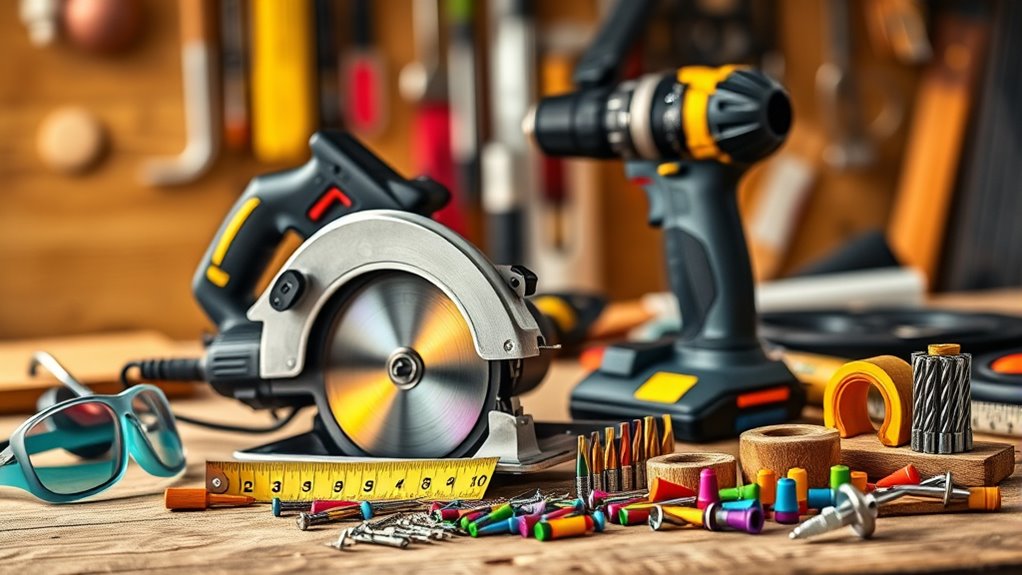
Power tools are essential for any DIY enthusiast, making tasks faster and easier. A cordless drill/driver is a must-have, allowing you to drill holes and drive screws in various materials.
Pair it with the right drill and screwdriver bits to guarantee precision. For cutting, a circular saw or jigsaw will help you tackle different materials effectively.
Don’t forget about accessories like extra batteries and toolboxes to keep everything organized. Impact drivers and nail guns speed up fastening, while specialty tools like routers and grinders add versatility to your projects.
With the right power tools and accessories, you’ll enhance your DIY experience and achieve professional results. Get ready to transform your ideas into reality!
Safety Equipment
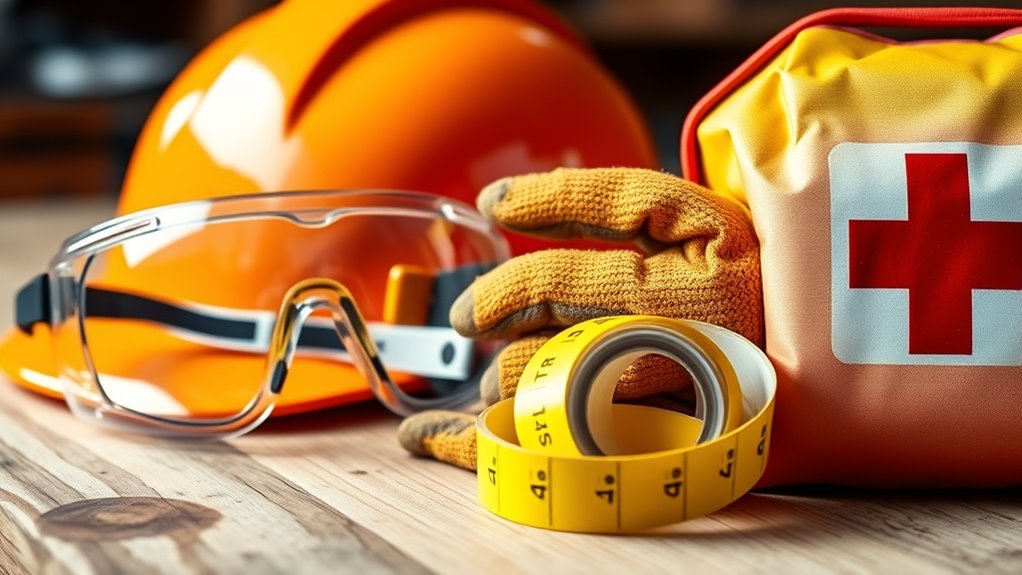
Safety equipment is essential for any DIY project, ensuring you stay protected while you work.
Always wear safety glasses to shield your eyes from debris and chemicals. If you’re sanding or drilling, a respirator or dust mask keeps harmful particles at bay. Use gloves to protect your hands from cuts and abrasions, and opt for steel-toed boots to safeguard your feet from heavy tools.
Hard hats are vital for overhead hazards, especially during demolition. Don’t forget ear protection to prevent hearing damage from loud noises.
Keep a well-stocked first aid kit for emergencies and install fire extinguishers and smoke detectors for safety.
Maintenance and Care for Tools
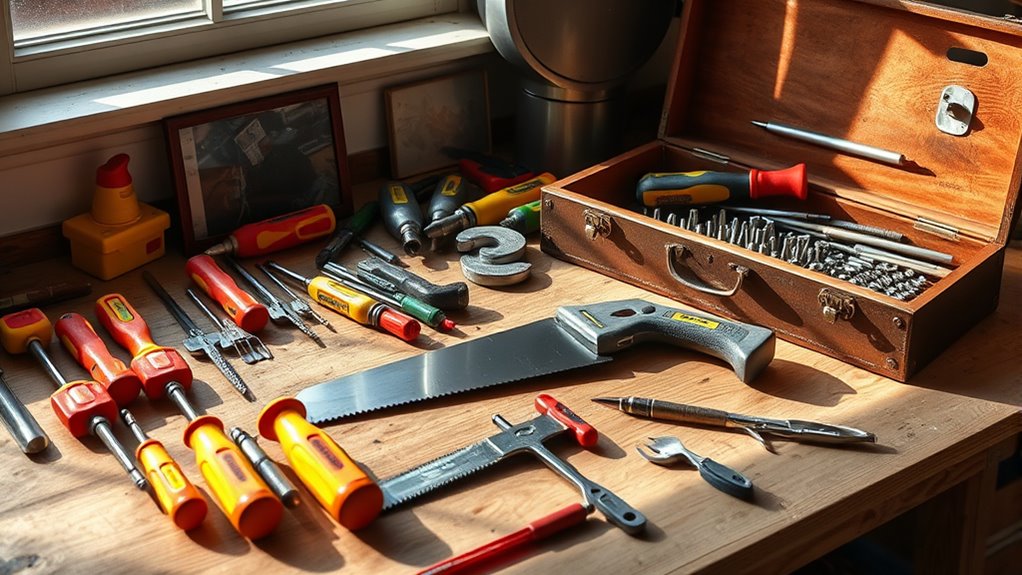
Maintaining and caring for your tools is essential to ensuring they perform well and last longer. Regularly clean your tools to remove rust and grime, which helps extend their lifespan.
Inspect them frequently to catch any wear or damage early on, allowing for timely repairs or replacements. Store your tools in dry, cool environments to prevent corrosion, and keep cutting tools sharp to improve efficiency.
Apply lubricants like oil to reduce friction. Organize your workspace with toolboxes, pegboards, and cabinets to keep everything accessible and secure.
Don’t forget to use protective coatings and maintain a schedule for regular check-ups. By following these practices, you can maximize your tools’ performance and longevity while minimizing hassle.
Frequently Asked Questions
What Tools Are Best for Beginners in DIY Projects?
If you’re just starting with DIY projects, a few essential tools can make a big difference.
Grab a measuring tape for accurate measurements and a spirit level to guarantee everything’s straight. A hammer and a basic screwdriver set are must-haves for assembly tasks.
Consider a cordless drill for drilling and driving screws efficiently. Finally, safety glasses are vital to protect your eyes while you work.
With these tools, you’ll be ready to tackle simple projects!
How Do I Choose the Right Tool for My Project?
Choosing the right tool for your project is like picking the right key for a locked door.
First, evaluate the tasks ahead and the materials you’ll use. Consider tools that offer versatility, ensuring they can adapt to future challenges.
Think about quality and safety features, as they’ll protect you during the journey. Budget wisely, and don’t hesitate to explore second-hand options or rentals to find that perfect fit for your DIY adventure.
Are There Eco-Friendly Tool Options Available?
Absolutely, there are plenty of eco-friendly tool options available!
You can choose biodegradable scissors made from natural materials or non-toxic adhesives that won’t harm the environment.
Consider using bamboo tools, which are renewable, or durable aluminum and steel garden tools that are recyclable.
If you’re into DIY projects, look for 3D-printed tools made from recycled materials.
With these choices, you’ll be crafting sustainably while minimizing your environmental impact!
How Can I Store My Tools Efficiently?
How can you store your tools efficiently?
Start by investing in portable tool boxes with wheels for mobility. Use pegboards to hang frequently used tools, keeping your workspace organized.
Consider stackable boxes for maximizing garage space and clear containers for easy visibility. Implement task-specific stations to enhance focus, and don’t forget to regularly audit your collection to maintain order.
With these strategies, you’ll streamline your workflow and save time on your projects.
What Safety Gear Do I Need for DIY Projects?
For your DIY projects, you need to prioritize safety gear.
Start with safety glasses to protect your eyes from debris, and consider goggles for extra face protection.
Wear heavy-duty gloves for hand safety and steel-toed boots to shield your feet from heavy objects.
Don’t forget a dust mask or respirator to filter harmful particles, and always keep a first aid kit handy.
These essentials will help you work safely and confidently.
Conclusion
With the right tools in hand, your DIY projects can transform from intimidating to delightful. You might think you need a garage full of equipment, but even a few quality essentials can release your creativity. Picture yourself effortlessly crafting a beautiful shelf or restoring an old chair with just a hammer, a saw, and a tape measure. So grab your tools, get started, and watch your ideas come to life—because every masterpiece begins with a single step!









